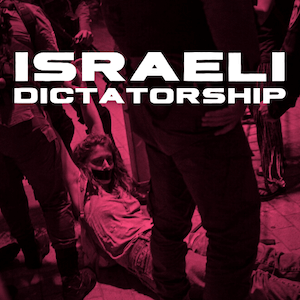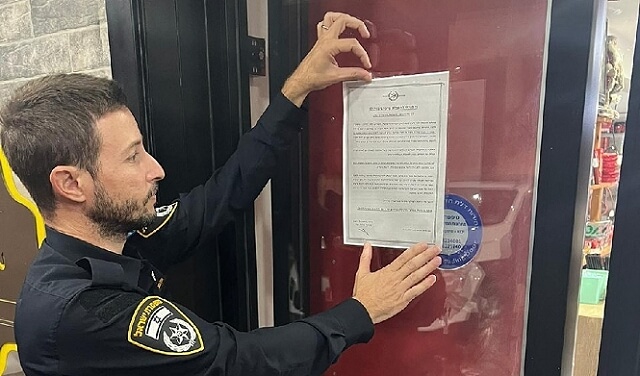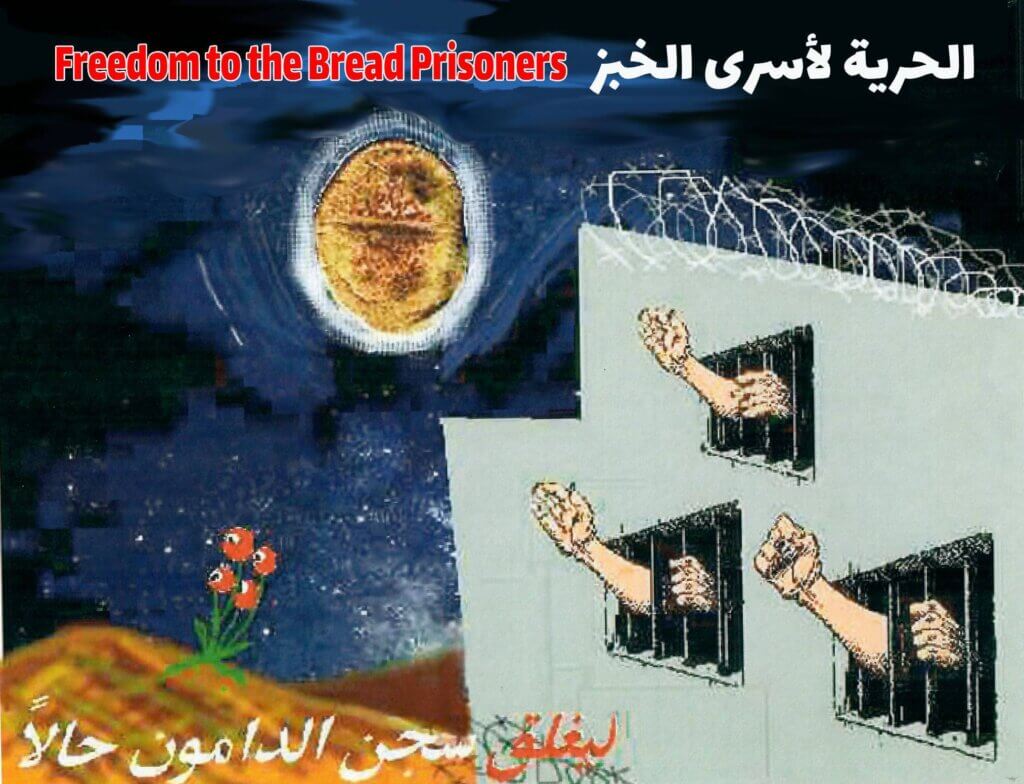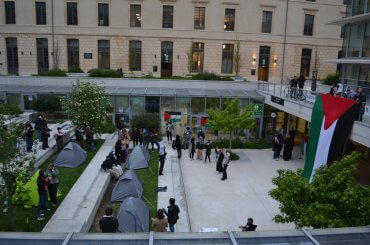
Regular remand hearings in the Haifa court are held in the basement, on the “minus 2” floor. Regular hearings are still suspended due to the “war situation,” but the remand courtroom and the adjacent waiting hall are bustling. There are still many new political detentions, mostly for social media posts. As part of the “situation,” Palestinian political prisoners, who are all categorized as constituting a “security” risk, are not brought to court and are only “attending the hearings” through video. With the gradual relaxation of the emergency measures, all other suspects may be present physically.
On Thursday, November 23, there were two dozen of us waiting for that day’s political trials, so I decided to sneak into the courtroom. A young, thin guy was standing in the suspect’s cage guarded by two “Nakhshon Combatants” — threatening-looking bullies from the special units of the prisons’ authority. There were only four other people in the courtroom: Judge Ihsan Halabi, his typist, the police prosecutor, and the suspect’s Arab lawyer, apparently from the public defender office.
I soon learned that the accused was from Yamoun, a town near Jenin in the West Bank, and that he was caught by the police at 37 Allenby Street in Haifa. These were all the facts of the criminal indictment that were presented to the court. It goes without saying that he did not have permission to be in Haifa, as all permits have been revoked since October 7 for Palestinian workers from the West Bank and Gaza — as part of Israel’s total war on Palestinians. It was not stated in the indictment, but the defense lawyer explained that his client came to Haifa for work. As there was no other claim regarding what he did in Haifa, the judge accepted it as a fact.
If it was not justice, at least it was efficient. The defense attorney pleaded guilty to the charge on behalf of the accused. The judge even made the effort to verify, in Arabic, with the Yamoun guy whether he understood what the lawyer said in Hebrew on his behalf. With the conviction closed and sealed, they turned to arguments about the appropriate punishment.
The police prosecutor was very enthusiastic to prove her case. She stressed the fact that the state of Israel was in an existential war after the cruel attacks of October 7, and that the accused, by entering the state’s borders illegally, “trampled with a rough foot over the sovereignty of the state!” She added that, in these dire days, the police are busy with multiple tasks, and the accused, by the fact that the police had to arrest him, diverted police forces from other important tasks and caused significant damage to state security. It reminded me of the soldier who accused me in court, claiming that his toenail was broken while he was kicking me.
Raising the range of punishment
The judge asked the prosecutor what, in her view, was the adequate range of punishment for the offense. She mentioned previous cases, including cases that were appealed and decided in higher courts — some of them from before October 7 and some of them newer. I learned that before October 7, the range of punishment for working without a permit was between suspended imprisonments and actual imprisonments for five months. Now, because of the war and the danger that the man’s “illegal presence” constitutes to public security, the minimum punishment for working without a permit has been raised to two months of actual imprisonment, in addition to a fine and suspended imprisonment. The higher end of “the accepted range” was also raised to seven months of imprisonment.
This means that any worker from the West Bank or Gaza who is caught on the wrong side of the apartheid walls (where there is work) should be punished with at least two months in prison to avenge the October 7 attacks.
The judge asked the prosecutor where, within this range, the Yamoun guy’s punishment should fall. She said it should be somewhere in the middle. He asked why and reminded her that usually those who are accused for the first time are punished at the lower end of the range. She said that the accused has already crossed the border several times before.
As she had no evidence to prove her claim, the judge said he would have to ignore it. Later, she claimed that the accused was already working in Haifa for eight months when he was caught. I hope she was right; at least he could have earned some money for his efforts before paying with his liberty. Again, the judge said there is no evidence for the time that the accused man spent, so he could not rely on it for setting the punishment.
Within less than a quarter of an hour from the beginning of the trial, the judge issued a verdict: two months imprisonment, two months suspended imprisonment, and a 1,000 shekel fine.
The untold story of the ‘bread prisoners’
The ability to control the “privilege” of working in Israel is a central tool of coercion for the occupation, building a complex system of permits, interrogations, and licensing. This system is intentionally arbitrary and, in many cases, also a source of corruption and blackmail. On the other side, many Israeli employers prefer to employ Palestinians from the West Bank and Gaza because they have no social rights. They are ready to work for long hours and less for money and sacrifice almost everything in order to stay on the job.
This discrepancy between limited supply and strong demand creates a strong “black market” of Palestinian workers. In better times, the army, desperate for the rigidness of its own “licensing” bureaucracy and trying to release some steam to lower tensions in the areas under its control, turns a blind eye to the thousands of workers who put their lives in danger while crawling under the apartheid fence in search for work. From time to time, soldiers suddenly shoot and kill workers at these unofficial crossing points. And when they do find work and a place to sleep, those unlicensed workers might be arrested and thrown into prison at any moment. We call them “Bread Prisoners.”
In several “involuntary visits” in Israel’s detention centers, I always had the impression that the Bread Prisoners were a big part of the population there. I always felt that their story was the most heartbreaking. They constitute a different kind of population, distinct from the criminal types on one side and the political types on the other. But theirs is an almost untold story.
As I explained in a previous post, the phenomenon of people from the post-1967 occupied territories crossing the walls without permission to find work is so prevalent that it has a special word for it in Hebrew. It is based on the Hebrew acronym for “Illegally Present,” and the shorthand term is Shabah, which also has its plural form, Shabahim.

For writing this post, I tried to search in the Hebrew and Arabic press for news about the detention of Shabahim, or unlicensed workers. There is almost none. But there is one obvious exception. In Zionist right-wing-religious sites, there are almost daily news dispatches praising the police for arresting more Palestinian workers. Combing through them, I learned that the different regions of the police are regularly publishing PR statements boasting of their raids on small and big businesses that might employ Shabahim, as well as on Arab towns and neighborhoods where they might find a place to sleep — constantly on the hunt for workers without permits. As part of the more vigilant effort to chase out Shabahim, they also detain some of their employers and put them on trial. In recent press releases, they also boasted of issuing administrative orders to close businesses where Shabahim were employed.
“Respectable” Zionist news sites like Haaretz, Ynet, Maariv, and even Israel Hayom, simply ignore these press releases, as they are clearly non-events that would not be of interest to their readers.
Yet, there is also an entire spectrum of “alternative Israeli media” sources that celebrate each detention. These are the sites that serve the growing public of religious and right-wing extremists. Many in this public are now organizing local militias, armed by the National Security Minister Itamar Ben-Gvir. Some of them volunteer to join the police in their manhunt. Their helpful presence is even mentioned in some of the police statements.
Well, I missed one report. One case was recently reported in detail by Ynet — maybe the most popular Hebrew news site. On November 14, under the title “Shabah from Gaza was caught in the Petah Tikva area — this is what he did there,” the article stated:
“While the Israeli economy is suffering a severe blow as a result of the war, and many have been forced into unpaid vacation, a resident of Petah Tikva is accused in court of employing an illegal present, a resident of Gaza, in his carpentry business. He even paid him 50 shekels per hour of work. This is when the minimum wage in Israel is about 30 shekels.
According to the indictment, the owner of the carpentry located in the Petah Tikva area, employed the Shabah from January 2022 until November 5, when he was caught without a permit to be in Israel.
As mentioned, the payment to which the Shabah was awarded was 50 shekels per hour of work, and more in cash. If that is not enough, the indictment also claims that the owner of the carpentry shop, since the beginning of October, let the Shabah sleep at a bakery in the area.”
Arresting workers on a daily basis is no news, but having the owner of a carpentry pay his Gazan workers above the minimum wage is what was so shocking. A blow to the Israeli economy in a time of war.
To be honest, even we, the people struggling for freedom, democracy, and social justice, tend to ignore the fate of the Shabahim. While we organized hundreds of vigils and demonstrations in solidarity with Palestinian political prisoners over the last decades, I can recall only a single demonstration that was dedicated to the fate of the “bread prisoners.” It happened in 2001, at the height of the Second Intifada. In the year 2000 the Damun prison on Mount Carmel — a series of tobacco warehouses from the British Mandate period that were converted to be used as a prison in 1953 — was declared by the Israeli Prison Services as unfit for housing human beings. But it was reopened specifically to hold the “Bread Prisoners” in 2001. The Arab-Jewish Ta’ayush (intentionally using the Arabic word for “coexistence”) movement organized a demonstration in front of the prison, demanding its immediate closure. A poster was made for the demonstration by artist Iris Bar.

It was a good demonstration, but Damun prison was not closed. In recent years, it was expanded with special wings for Palestinian female political prisoners, as well as a wing for Palestinian child prisoners. Some of Damun’s prisoners were released yesterday, November 24, or are expected to be released soon as part of the prisoners’ exchange.
But the Bread Prisoners, the heroes of the struggle for existence, as well as the heroes of the struggle for freedom, will continue to fill the occupation prisons as long as the apartheid system is not dismantled.



Another example of Israel (as with the rest of the West) harming its own economy via anti-migrant laws and practices.
I’m not sure that many Palestinians recognise the concept of “peacetime”, though.
https://www.npr.org/2023/11/04/1210588361/israel-palestinian-workers-construction-economy
I hope no member of the current British government is reading this. They’ll want to copy it.